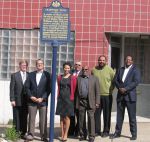Standing on the corner of Wylie Avenue and Elmore Street in Pittsburgh’s Hill District, Franco Harris looks across the street at the names of jazz legends etched on the Legacy senior building—Billy Eckstine, Erroll Garner, Earl “Fatha” Hines—and starts nodding his head.
“This is a good corner,” the Hall-of-Famer said. “You stand here and your head just starts bopping up and down. This is such a historic site that the preservation and history of it has to live on. So the question is, how do we do that? Well, the first step is to buy this building—so we did.”
The building Harris is referring to is the Crawford Grill, a Hill mecca for jazz that closed in 2003. He is among a group of four private investors and three nonprofits that purchased the property in February. The others include Randall Industries founder Greg Spencer, Transportation Solutions owner Dwight Mayo, former Fisher Scientific CEO Bill Recker; Pittsburgh Gateways, The Keystone Innovation Zone and The Hill House Economic Development Corp.
The group plans to restore and preserve the building’s interior space as it was in its heyday and to expand into a vacant lot next door—which the group is currently closing on—with new restaurant and nightclub space. There are also plans for an educational component that would convert the current building’s upper floors to studio, workshop, educational and meeting space, so the Hill District’s jazz legacy can be passed on.
“We had all these talented people who came from Pittsburgh like Ahmad Jamal, who I just saw at the first ever National Jazz Day concert here,” said Harris. “And though they went elsewhere to pursue their careers, they always came back and they were great ambassadors for Pittsburgh. Can we capture how things were and how they evolved? It will be hard, but we’ll try to preserve that feel as closely as possible.”
Pittsburgh Gateways President Robert Meeder said the nonprofits got involved to assist with development issues and will have no part in the eventual operation.
“We as a group are looking to bring back the Grill without compromise. The nonprofits would establish a music-programming theme. So we’re looking at preserving the legacy and establishing an entertainment venue,” he said. “I mean, nonprofits can’t own bars, but we’re involved because we thought if we didn’t do something, it might be turned into a butcher’s shop or torn down completely.”
Spencer said the group is probably a year away from beginning restoration work, and they are still ironing out design ideas.
“It’s a diverse group of investors, and there are diverse perspectives on what to do,” he said. “If it was up to me you’d go in the same door you always did, with the bar on the right and the stage where it was and have an arch into the new space.
“We want to keep as much of what the old Grill was as possible—jazz, a bar with lunch or dinner fare. To me, the more we can talk about it, the more we can get some of the folks who were part of it years ago to give us some insight into it.”
Victor Rogue, Hill House Association interim president and CEO, said the association became a partner because it is interested in restoring vitality of the entire Hill District and the Crawford Grill is part of that vitality.
“When I first came to town 15 years ago, this was the first place I stopped. We want to see the Hill come back as a prime area for housing and commerce,” he said. “This project attracted us because of its history. The history of the Grill is the history of the Hill.”
(Send comments to cmorrow@newpittsburghcourier.com.)
